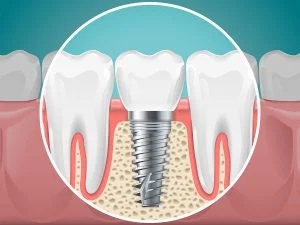05 Apr Dental Implants: What is osseointegration?
 Dental implants make for excellent replacement teeth because they are very durable and stable. A dental implant’s unmatched reputation for stability as prosthetic teeth is due to the fact that they are embedded into the jawbone by an implant dentist. After implantation, bone will begin to fuse to the implant through a natural biologic process called osseointegration. This process means that bone will anchor and support a dental implant the same way it would hold the roots of a natural tooth.
Dental implants make for excellent replacement teeth because they are very durable and stable. A dental implant’s unmatched reputation for stability as prosthetic teeth is due to the fact that they are embedded into the jawbone by an implant dentist. After implantation, bone will begin to fuse to the implant through a natural biologic process called osseointegration. This process means that bone will anchor and support a dental implant the same way it would hold the roots of a natural tooth.
The natural process of bone responding to titanium by fusing to it (osseointegration) was discovered in the middle of the 20th century. Throughout history, dental and medical practitioners tried to replace teeth by embedding prosthetics made from various materials. Until titanium was studied, there was nothing available to replace the roots of teeth that would not be rejected by the body as a foreign object.
How do dental implants work?
A dental implant is essentially the replacement for the root of a tooth that will also hold a restoration like a crown or a prosthetic such as a bridge or denture. Implants, since they are metal and have a ridged texture, are sometimes compared to the appearance of screw. Its tapered end is embedded into the bone where a tooth’s root once was.
After our implant dentist embeds an implant, a patient will return to our office for follow-up appointments so that our team can monitor the process of osseointegration. Once the implant is stable, its permanent prosthetic or restoration will be secured to an abutment on the implant to complete the smile restoration process.
How do I take care of implants?
When compared to other types of replacement teeth, dental implants are considered very low maintenance. This is because they are cleaned by brushing and flossing – the same way that a person would clean biological teeth.
If you have suffered with tooth loss, call Charlottesville Oral Surgery and Dental Implant Center to schedule a tooth replacement consultation.
